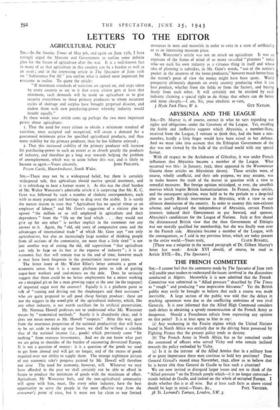SIR, —There may not be a widespread belief, but there is
certainly widespread talk, that agriculture should receive special treatment, and it is refresh,ng to hear a farmer resent it. As this was the chief burden of Mr. Walter Worcester's admirable article it is surprising that Mr. K. C. Gore was followed by such a number of choleric correspondents, each with so many pungent red herrings to drag over the arable. It is surely the merest truism to state that " Agriculture has no special virtue as an employer of labour," and M. Gore's suggestion of a sinister plot to uproot " the million or so still employed in agriculture and their dependents " from the " life on the land which . . . they would not give up for any other " is neither implicit in the statement nor any answer to it. Again, the " old, old story of comparative costs and the adVantages of international trade " of which Mr. Gore says " not only agriculturists, but also an increasingly large number of thinking people from all sections of the community, are more than a little tired " is not just another way of stating the old, old superstition " that agriculture can wily be kept on its feet at the expense of industry " ; it is an economic fact that will remain true to the end of time, however much it may have been forgotten in the protectionist inter-war years.
The bitter irony of Mr. Walter Elliot's letter contains a germ of economic sense, but it is a mere platform point to talk of putting sugar-beet workers and coal-miners on the dole. Does he seriously suggest that there could be no better employment for a miner working on a marginal pit or for a man growing sugar at the cost (to the taxpayer) of imported sugar over the counter? Equally is it a platform point to talk of " ruining and driving out the shopkeepers and their assistants " who are quite prepared to sell good cheap foreign produce: these are not the niggers in the wood-pile of the agricultural industry, which, like any other industry, is not worth sacrifices for its artificial preservation.
Mr. Norman Howell professes not to understand what Mr. Worcester means by " economical methods." Surely it is abundantly clear, and it does not mean money as Mr. Howell " suspects." After this war, apart from the enormous proportion of the national productivity that will have to be set aside to make up our losses, we shall be without a sizeable slice of the national income (i.e., goods) which previously came " for nothing " from overseas investments. And we do not know what part we are going to shoulder of the burden of succouring devastated Europe.
It is not a question of money: it is a question of the goods we used to get from abroad and will get no longer, and of the excess of goods required over our ability to supply them. The strange nightmare picture of our economic rake's progress painted by Mr. Howell will therefore not arise The need for economy, however, will. Whatever we may have afforded in the past we shall certainly not be able to afford in future to produce the minimum of goods with the maximum of effort.
Agriculture, Mr Worcester feels, and the non-agricultural community will agree with him, must, like every other industry, have the best
opportunity to serve the people in the most effective way from the consumer's point of view, but it must not lay claim to our limited
resources in men and materials in order to exist in a state of artificiality or as an interesting museum piece.
Mr. Worcester's article was not an attack on agriculture. It was an exposure of the frame of mind of so many so-called " planners " today who see each his own industry as a virtuous thing in itself and whose idea of planning is subsidies, in Mr. Gore's words, " out of the nation's pocket in the interests of the home producers," however much better from the nation's point of view the money might have been spent. World prosperity ultimately depends on every country producing what it can best produce, whether from the fields or from the factory, and buying freely from each other. It will certainly not be attained by each industry claiming a special right to do things that others can do better and more cheaply.—I am, Sir, your obedient se,vant,






























 Previous page
Previous page